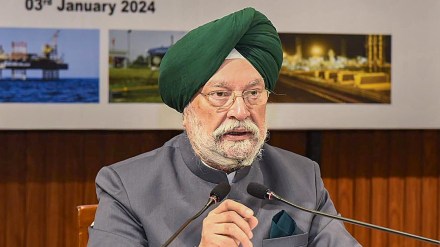The Union minister for petroleum and natural gas Hardeep Singh Puri on Wednesday asserted that the government hasn’t asked state-owned marketing companies (OMCs) to reduce retail prices of petrol and diesel.
Refuting reports that the OMCs might cut prices of the auto fuels, given the recent moderation in global crude oil prices, and the coming Parliament elections, Puri said: “First of all, all these media reports (on fuel price cut) are not only speculative, but I would also turn around and say, slightly mischievous. I have clarified that there have been no discussions with OMCs (in this regard).”
The OMCs have kept fuel prices unchanged since April 2022. Addressing the media here, the minister also said that, “We are in a highly turbulent situation. There are two areas on the global map which are in conflict situation.”
He emphasised on the current turbulence in the global oil markets including the disruption of major shipping routes, the Red Sea, and said that India is navigating through the situation very carefully.
“This is a very highly volatile situation and our primary responsibility is to ensure availability and affordability,” the minister said. Puri’s comments come after reports suggested that fuel prices, which are deregulated, may be cut in the range of Rs 4-6 per litre, and a proposal under consideration involves government and OMCs to bear equal burden of it (the former via excise/cess cuts and the latter, vial retail-price cuts).
The minister, however, explained that the government’s approach is to keep fuel prices under control as compared to the steep rise in prices in South Asian and western countries.
“In South Asian countries, the prices of petrol and diesel increased by around 40-80%. In the western industrialised world, the prices have gone up…but here (in India), the prices have come down,” the minister said, while noting the cuts in central excise duty/cesses by the government in November 2021 and May 2022.
“We will lead a very stable, positive, forward looking situation where every thing is available and affordable,” Puri said.
Crude prices that have touched their highest level of $97 per barrel in September, have now moderated but face the uncertainty of a potential rise again, analysts say. If this happens, the cost of raw material for the OMCs is expected to increase.
In the first two quarters of the financial year, the three OMCs — IOC, BPCL and HPCL– have been able to make healthy profits compared to the first half of the last fiscal primarily on the back of improved marketing margins.
Currently, there are central taxes of 20.6% on petrol and a 17.6% on diesel. “Even if such chaotic events (sudden geopolitical tensions) fail to emerge over the next 12 months, volatility will remain high as most energy markets have not yet been able to adapt to previous swings in supply and demand fundamentals to find a new normal,” Dan Klein, Head of Energy Pathways, S&P Global Commodity Insights had said.
